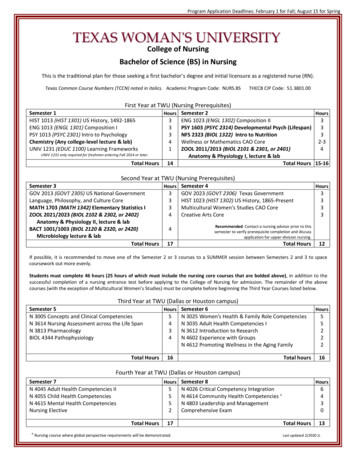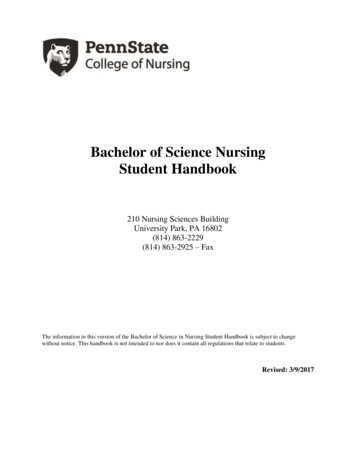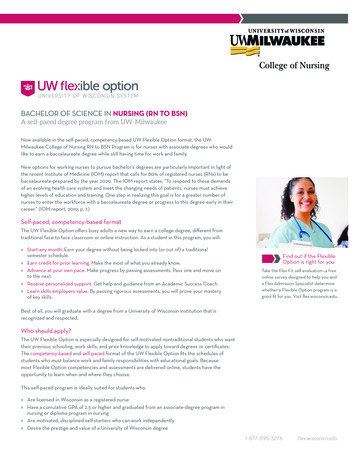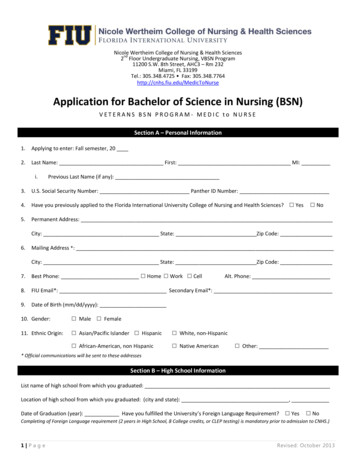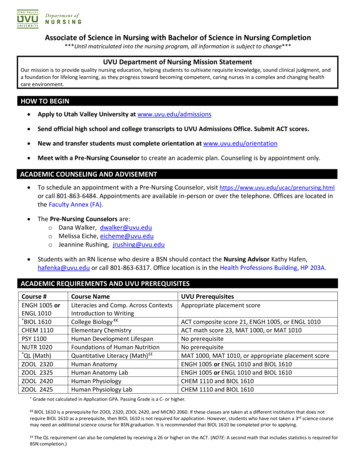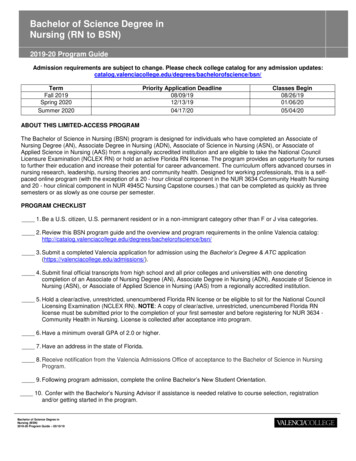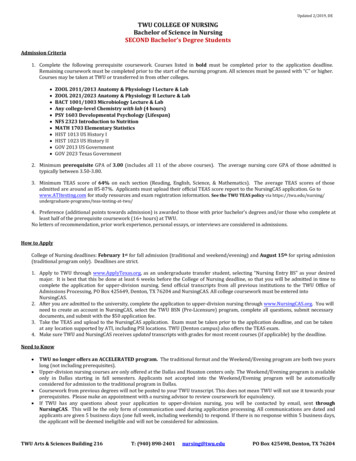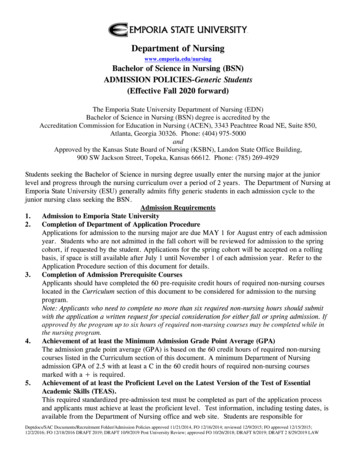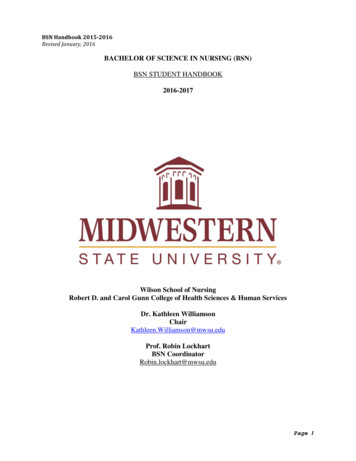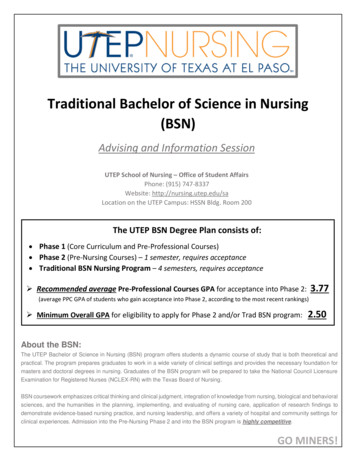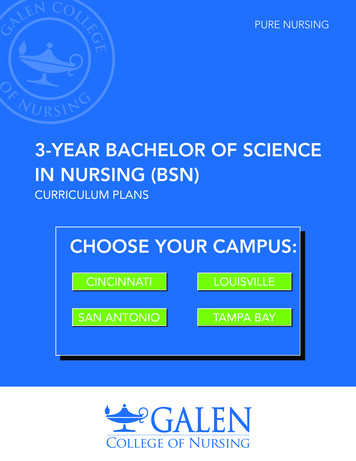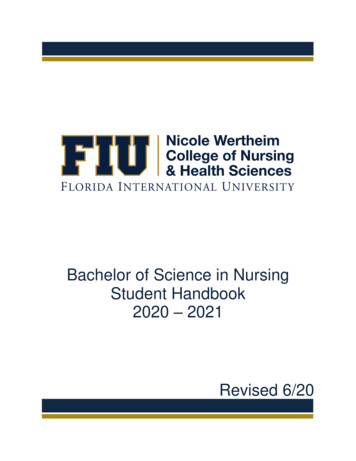
Transcription
Bachelor of Science in NursingStudent Handbook2020 – 2021Revised 6/20
Welcome to All Prospective Bachelor of Science in Nursing (BSN) Students:Our Bachelor of Science in Nursing (BSN) programs are accredited by the Commission on CollegiateNursing Education (CCNE). The undergraduate nursing faculty and I are happy that you are interested inour nursing program and we welcome the opportunity to help you learn more about our programs.We have three distinctive BSN tracks that will meet the needs of prospective students seeking a BSN: (a)the Generic BSN track, (b) the RN-to-BSN track, and (c) the Accelerated Option (AO) track. Our BSNprogram tracks are highly competitive. Your journey will be challenging, but undoubtedly rewarding. Ifyou are committed to becoming a leader in the nursing profession, the Nicole Wertheim College ofNursing and Health Sciences is for you.Our BSN programs are rigorous. Classes are taught by expert nursing faculty who bring extensiveexperience as clinicians, educators, and scholars.Our BSN graduates are prepared as general clinical practitioners and scholars and eligible to take theNational Council Licensure Examination for Registered Nurses (NCLEX-RN ) for licensure as aRegistered Nurse. Our BSN graduates are thoroughly prepared for graduate study in Nursing.The faculty and I are looking forward to meeting you. We are here to assist you in your journey to becomean FIU nursing graduate. Best wishes!Sincerely,Dr. Maria Olenick, PhD, FNP, RNChair Undergraduate NursingFlorida International University – Nicole Wertheim College of Nursing & Health Sciences1
FLORIDA INTERNATIONAL UNIVERSITYNICOLE WERTHEIM COLLEGE OF NURSING & HEALTH SCIENCESBSN STUDENT HANDBOOK2020-2021TABLE OF CONTENTSDESCRIPTION OF THE NICOLE WERTHEIM COLLEGE OF NURSING AND HEALTH SCIENCES . 3BSN PROGRAM & CURRICULUM. 4GENERAL STUDENT INFORMATION/POLICIES & PROCEDURES . 14STUDENT GOVERNANCE. 15GENERAL ACADEMIC INFORMATION/POLICIES & PROCEDURES . 15ACADEMIC PROGRESSION INFORMATION/POLICIES & PROCEDURES . 18GRADES AND GRADING . 20ACADEMIC CONDUCT AND PERFORMANCE . 23EXAMINATION POLICIES/PROCEDURES . 25ACADEMIC WARNING, PROBATION, AND DISMISSAL . 26CLINICAL CONDUCT AND PERFORMANCE . 27CLINICAL EXPERIENCES . 30CLINICAL DRESS GUIDELINES . 34GRADUATION PROCEDURES AND GUIDELINES . 37STATE BOARD OF NURSING LICENSURE APPLICATION. 372
DESCRIPTION OF THE NICOLE WERTHEIM COLLEGE OF NURSING AND HEALTH SCIENCESThe academic nursing programs are located in the Nicole Wertheim College of Nursing and Health Sciences(NWCNHS) and are housed on the Modesto A. Maidique Campus (MMC) in the Academic Health Center 3Building, and on the Biscayne Bay Campus (BBC) in the Academic 2 Building. TheCollege’s baccalaureate and graduate degree programs are fully accredited by the Commission onCollegiate Nursing Education (initial accreditation occurred in 2008), the Council on Accreditation (COA) ofNurse Anesthesia Educational Programs (re-accreditation occurred in 2019), and are approved by theFlorida Board of Nursing (re-approval occurred in 2011.)A broad range of nursing degree programs are currently offered by the College and include a bachelor'sdegree in nursing, a master's degree in nursing- nurse educator, and a Doctor of Philosophy degree innursing. The Doctor of Nursing Practice was implemented in January 2012. The nursing unit holdsinstitutional memberships in the American Association of Colleges of Nursing (AACN), the NationalLeague for Nursing (NLN), the Southern Collegiate Council of Nursing of the Southern RegionalEducation Board, the Florida Nurses Association (FNA), the Nursing Shortage Consortium of SouthFlorida, and the South Florida Hospital and Health Care Association.HistoryNursing was present on the FIU campus from 1972 to 1978 when a RN-BSN degree was offered throughthe School of Health and Social Work. In 1982 the School of Nursing was established at BBC as anautonomous upper division unit through start-up funds provided by nine Miami hospitals. These healthcare organizations were concerned about the acute nursing shortage and were interested in contributingto baccalaureate education for qualified men and women who could assume beginning leadershippositions in health care in the rapidly growing South Florida region.During 1997, the School of Nursing merged with the College of Health to create a new academic unit, theCollege of Health Sciences. The College of Health Sciences included the School of Nursing and theDepartments of Physical Therapy, Occupational Therapy, Dietetics and Nutrition, Medical LaboratorySciences, Public Health, Health Information Management, and Speech-Language Pathology. Therationale for the merger was to enhance one of the University’s strategic themes, Health, through theconsolidation of the health professions programs and development of interdisciplinary education andresearch.During 1999, the College of Health Sciences merged with another academic unit, the College of Urbanand Public Affairs, which gave rise to a new college, the College of Health and Urban Affairs(CHUA). CHUA included four schools: School of Nursing; School of Health; School of Social Work; andthe School of Policy and Management. The purpose of the restructuring was to consolidate the healthrelated fields in one college and to enhance interdisciplinary education and research in these areas. Dr.Ronald Berkman was appointed Executive Dean of the College and Dr. Divina Grossman was appointedDean of the School of Nursing.In December 2004, the School of Nursing joined its sister schools in CHUA by relocating from the BBC toa newly constructed Health and Life Sciences 2 building at the MMC, approximately 20 miles away. Themove to the MMC was part of an overall strategy to locate nursing with other health related units in thecontext of the proposed medical school and the development of the academic health sciences complex.The new building provided nursing classrooms, teaching laboratories, offices, and research space. Toprovide for expansion, the School retained offices, classrooms, and laboratories at the BBC.3
On October 1, 2006 the School of Nursing was transformed to the College of Nursing and HealthSciences (CNHS) when CHUA was disaggregated into three (3) autonomous units: the CNHS, theCollege of Social Work, Justice, and Public Affairs, and the Stempel School of Public Health. The CNHSincluded Nursing and the Departments of Physical Therapy, Occupational Therapy, Health InformationManagement, Health Sciences, Communication Sciences and Disorders, and Athletic Training. Thedisaggregation provided autonomy for the educational units as they sought accreditation or reaccreditation from their professional agencies and laid the foundation for the future health sciencescomplex. Dr. Divina Grossman was appointed Dean of the CNHS and reported to the Provost.In December 2006, University administrators announced that a new CNHS building would be erected onthe MMC. The 47 million 113,000 sq. ft. building would house the College’s combined disciplines thatwere scattered throughout two buildings and rapidly outgrowing them. The CNHS building (AHC 3),completed in December 2009, became part of the academic health sciences complex envisioned at theMMC.In 2009, the University-wide budget cutting process required a feasibility review of all CNHS programsand tracks. Two College departments (Health Information Management and Health Sciences) werephased out as a result of the review. CNHS expansion re-occurred in 2011 with the assimilation of HealthServices Administration, a baccalaureate level program previously housed in the Stempel College ofPublic Health and Social Work. In February 2010, CNHS Dean Divina Grossman was promoted to VicePresident of Engagement at FIU; Dr. Sharon Pontious was appointed Interim Dean until July 1, 2011when Dr. Ora Strickland was appointed CNHS Dean.The current CNHS consists of the Nursing Unit as well as Departments of Physical Therapy, OccupationalTherapy, Communication Sciences and Disorders, Athletic Training, and Health Services Administration.The nursing undergraduate and graduate academic programs are administered by Program Directors;other CNHS academic departments are administered by Chairs. Thanks to a generous donation in theFall of 2013, the college celebrated 30 years at FIU with a new name, The Nicole Wertheim College ofNursing and Health Sciences (NWCNHS).Bachelor of Science in Nursing (BSN) ProgramThe Bachelor of Science in Nursing (BSN) degree was approved as an upper division program in 1982 bythe Board of Regents of the State University System. The National League for Nursing (NLN) grantedinitial accreditation in 1985. Upon completion of the BSN Program, the basic (generic) student graduate iseligible to become licensed as a registered nurse. The nursing unit also offers a RN-BSN completiontrack. Graduates of the BSN Program are eligible for graduate level studiesIn 2014, the Bachelor of Science in Nursing Accelerated Option track was added. The Accelerated OptionBSN (AO) track is specifically designed for those individuals who are highly motivated to begin a career innursing and have previously earned a bachelor’s degree in another field.BSN PROGRAM & CURRICULUMBSN Program PurposesThe BSN program prepares graduates to practice in increasingly complex and technological health caresystems. The purposes of the BSN program are to prepare the graduate to: Function as a professional nurse generalist. Function as an accountable and responsible citizen.4
Participate in evidence-based health care delivery, research, education, leadership, andconsultation services in the local, regional, national, and global community. Recognize and respond to the need for continuing professional development.BSN Program ObjectivesThe BSN program’s purposes are achieved through program objectives. The objectives of the BSNprogram are to prepare the graduate to: Synthesize knowledge from nursing and related disciplines in the provision of care to clientswithin the health-illness continuum throughout the life span. Utilize creative leadership to promote quality health care and patient safety in a rapidly changingmulticultural, multiethnic, global environment. Synthesize and apply evidence and research findings from nursing and from other disciplines toimprove or change nursing practice. Use appropriate and current technology and skills in the delivery of safe and effective patientcare. Function as an advocate and change agent in influencing healthcare policies, delivery,economics, and health disparities to improve the quality of health for diverse populations. Collaborate and communicate with members of the health care team in the delivery ofindividualized, cost-effective and ethical health care services. Demonstrate an understanding of accountability, responsibility, values, and standards of moral,ethical, and legal conduct that impact the role and practice of the professional nurse. Utilize theoretical knowledge and clinical competencies in caring for culturally diverse populationsin a variety of clinical settings.5
Nursing UnitOrganizing Framework: BSN, MSN, and Doctoral (DNP & PhD) Programs6
Curriculum Framework DefinitionsCOMMUNICATION & COLLABORATION. (Pervasive Thread). Communication is the process by whichinformation, ideas, beliefs, values, and feelings are interchanged. Communication involves symbols, suchas written words, gestures, images, and spoken language. Communication is influenced by inherentcapacities, socio-cultural background, environment, attitudes, past experiences, knowledge of subjectmatter, and ability to relate to others. Communication is also affected by technological advances in healthcare. Communication is inherent in collaboration and requires critical thinking skills.Collaboration is the process of making and carrying out decisions with other people regarding health careand research in a caring context. Knowledge of health-care systems includes an understanding of theorganization and environment in which nursing and health care is provided. Collaborative leadership is aset of skills to accomplish both individual and collective goals. Collaborative leaders must be excellentcommunicators of a clear vision based in theories of change and understanding of health care dynamics.Effective communication and collaboration are the foundation for developing therapeutic relationships forthe purpose of providing patient care, conducting research, and collaborating with members of teams andcommunities at local, regional, national, and global levels.CULTURAL COMPETENCE. (Pervasive Thread). Cultural competence is the integration of knowledge,behaviors, skills, and attitudes required to provide quality health care and conduct research with peoplefrom different cultures, transcending national boundaries. Cultural competence involves tailoring healthcare delivery to meet patients' ecological, biosocial, cultural, and linguistic needs to improve outcomesand eliminate disparities in healthcare. Cultural competence includes being able to recognize andrespond to patient population health-related beliefs and values, disease incidence and prevalence,genetics and treatment outcomes. Cultural competence may be viewed as a process by which thehealthcare professionals continually engage in self-evaluation and strive to effectively work within thecultural context of the individual, family, population, and/or community.DECISION MAKING PROCESS. (Pervasive Thread). The decision-making process is the formulation andrevision of conclusions based on knowledge acquired. The decision-making process requires reflectivethought, interdisciplinary focus, global perspective, use of technology, ethical/legal considerations, andcomfort with ambiguity. Critical thinking entails the acquisition of knowledge with the intent of deliberateinquiry and involves understanding of different alternatives before making decisions. The decision-makingprocess is influenced by many factors such as: patterns and similarity recognition, sense of importance ofthe facts, common-sense understanding, skilled “know-how” and deliberate rationality. Decision makingprocess outcomes incorporate scientific evidence, patient culture, values and preferences, and clinicalexpertise.ETHICS. (Pervasive Thread). Ethics is a set of shared values or principles that govern the way nursesinteract with patients, families and other health professionals. A Code of Ethics makes explicit the primarygoals, values, and obligations of a profession. Individuals who become nurses are expected not only toadhere to the ideals and moral norms of the profession, but also to embrace them as a part of what itmeans to be a nurse. The ethical tradition of nursing is self-reflective, enduring, and distinctive.EVIDENCE-BASED PRACTICE, SCHOLARSHIP & RESEARCH. (Vertical Thread). Professional nursingis grounded in the application of evidence from research, expert panels, opinion leaders, research-basedtheories, clinical expertise, assessment data (including preferences and cultural values), and healthcaredata. Basing practice on evidence from several sources improves outcomes in practice, education,administration, and research at local, regional, and national, global levels. Professional nurses participate7
in the scholarship of discovery, application, integration, and teaching. Professional nurses are committedto evaluating, creating, conducting, and communicating research findings.GENOMICS. (Pervasive Thread). Genetics refers to the study of individual genes and their impact onsingle gene conditions while genomics examines all genes together and how they interact with eachother, the environment, cultural, psychosocial and other factors. The study of genomics assists nursesand other health care practitioners and researchers to find better ways to promote health and prevent andtreat disease in individuals, families, populations and communities.GLOBALIZATION. (Pervasive Thread). Globalization is the system of interaction among the peoples,communities, and countries of the world. Globalization of health requires the dissemination of knowledgeand the use of best evidence to impact policies and improve world health in a manner that transcends allcultural, economic, environmental, political, and social boundaries. The professional nurse utilizes anintegrative, cross-disciplinary approach to effectively address health care disparities and reduce theoverall burden of disease.GLOBAL HEALTH SYSTEMS. (Vertical Thread). Global health systems encompass the personnel,institutions, commodities, information, financing, and governance strategies that support universaldelivery of health promotion and preventative services in a fair and equitable manner, responding topeople’s needs and expectations. Global health systems define the administration of health care in termsof market incentives, health impact, consumer satisfaction, and performance monitoring.HEALTH/ ILLNESS MANAGEMENT. (Vertical Thread). Health/illness management includes a scope ofservices across the health/illness continuum. Nursing practice includes management of health promotion,risk reduction/illness/injury prevention, health maintenance, health restoration, rehabilitation, palliativeand end of life care for diverse individuals, families, groups, and vulnerable populations. Optimalhealth/illness management requires nurses to apply and synthesize knowledge, skills, behaviors, andattitudes to make decisions, develop strategies, and design integrative plans of care. Health/illnessmanagement principles and guidelines are developed from nursing and interdisciplinary research.Health/illness management starts at the undergraduate level and builds at the graduate and doctoral levelwith increasing depth and breadth of knowledge, synthesis of data, complexity of skills and interventions,and role autonomy.PROFESSIONAL NURSING. (Vertical Thread). Professional nurses use a well-delineated and broadknowledge base for practice. Inherent in professional nursing is an understanding of the historical, legal,empirical, and contemporary context of research and evidence-based practice. Professional nursingrequires strong critical reasoning, clinical judgment, communication, collaboration, and assessment skills.Professional nursing also requires the development and demonstration of a set of core values andprinciples, an ethical framework for practice, and involves accountability for one’s self and nursingpractice within the parameters of professional regulation, competencies and scope ofpractice. Professional nurses are advocates for high quality care and are knowledgeable and active in thepolicy processes defining healthcare delivery systems. Th
DESCRIPTION OF THE NICOLE WERTHEIM COLLEGE OF NURSING AND HEALTH SCIENCES The academic nursing programs are located in the Nicole Wertheim College of Nursing and Health Sciences (NWCNHS) and are housed on the Modesto A. Maidique Campus (MMC) in the Academic Health Center 3 Building, and on
